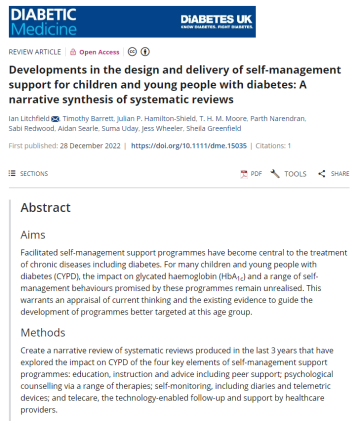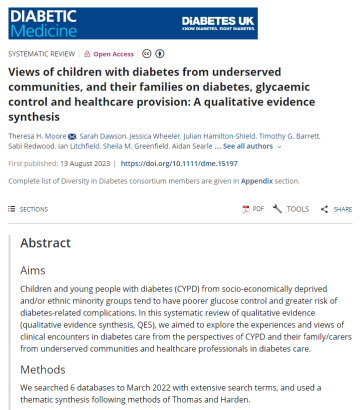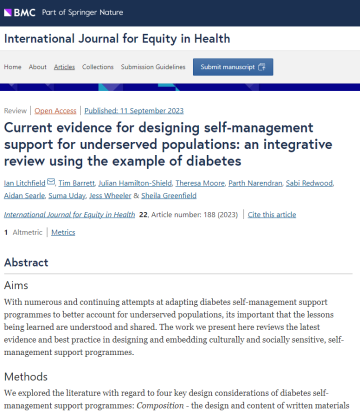Improving diabetes management in children and young people from underserved communities
- 12 September 2023
Children and young people with diabetes from families in underserved communities have higher blood sugar levels than average. Providing flexible, family-focussed support and addressing socio-cultural and emotional issues could improve how they manage their condition, according to a series of papers published as part of the Diversity in diabetes study.
To start with, researchers at the diet and physical activity theme of the Bristol Biomedical Research Centre (Bristol BRC), Applied Research Collaboration West (ARC West) and the University of Birmingham reviewed the range of diabetes self-management programmes available to children and young people. They did this by creating an overview of research that had been produced about this topic over the past three years.
The study team found that interventions should be adjusted according to the needs of families, while giving them skills to manage their children’s diabetes. They found that gamification (adding game-style elements like point scoring into non-game activities) could improve how children and young people engage with programmes, while also introducing them to information about their condition. Programmes could be used to motivate families and young people to engage with diabetes services.
Dr Theresa Moore, author and study team member, said:
“Self-management programmes are important because they help people living with diabetes manage their condition.
“However, children and young people with diabetes from underserved families don’t get the same benefits from these types of programmes as other populations.
“Understanding why this is means we may be able to design interventions that help these children and young people better control their blood sugar and avoid complications.”
The research team also reviewed studies that had previously explored the experiences and views of children and young people from underserved communities, living with diabetes, as well as those of their families and carers. Underserved communities are communities whose access to healthcare and other resources may be limited or significantly reduced.
The study team found few studies talking with children and young people about their views. From the available evidence, researchers found that getting to know a child or young person and their family played an important role in providing them with care. Involving families in decision making and empowering them to work with healthcare professionals was likely to improve their engagement with services and diabetes self-management. Using this person-centred approach also had the potential to mitigate health inequalities.
Dr Aidan Searle, author and study team member, said:
“The qualitative evidence synthesis led to the development of a conceptual framework from which to explore and strengthen the ‘therapeutic alliance’ in the clinical encounter for children and young people with diabetes and their family/caregivers.
“Communicating the biomedical aspects of managing diabetes in the clinical encounter is important but should be balanced with addressing socio-emotional and cultural factors important to children, young people and their family/caregivers.
“The findings will serve to address the failings of past approaches to improving diabetes self-management by showing the value of exploring the clinic experience of underserved communities. By taking this approach to intervention development we hope to reduce inequalities in diabetes outcomes.”
The third paper focused on exploring the latest evidence and best practice in designing self-management programmes tailored to the cultural and social needs of underserved communities. Researchers confirmed that written information should be easy to understand. Programmes should be flexible and offer group, individual and remote learning. They should, if possible, be delivered by community-based providers and integrate into existing health systems.
Dr Ian Litchfield, author and study member, said:
“We found useful and recent examples of design innovation that can improve self-management amongst underserved communities. Though, to maximise impact, it’s recommended that future programmes are co-produced by both providers and patient stakeholders with delivery being embedded in local health systems.”
Diversity in diabetes
This research was part of the Diversity in diabetes study. Diversity in diabetes is a study aimed at identifying barriers to engagement with diabetes self-management and with diabetes services. It focuses on understanding the support needs of children and young people by looking at existing evidence, interviewing families and exploring the practicalities of delivering services to optimise blood sugar control. It also pays special attention to individuals’ socio-economic status, culture and ethnicity to empower them to self-manage their condition.

Developments in the design and delivery of self-management support for children and young people with diabetes: A narrative synthesis of systematic reviews

Views of children with diabetes from underserved communities, and their families on diabetes, glycaemic control and healthcare provision: A qualitative evidence synthesis
